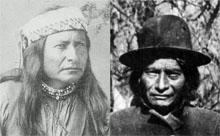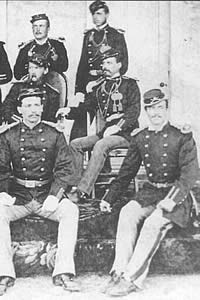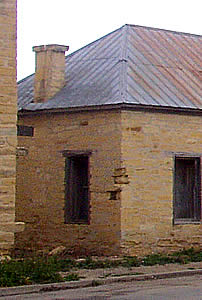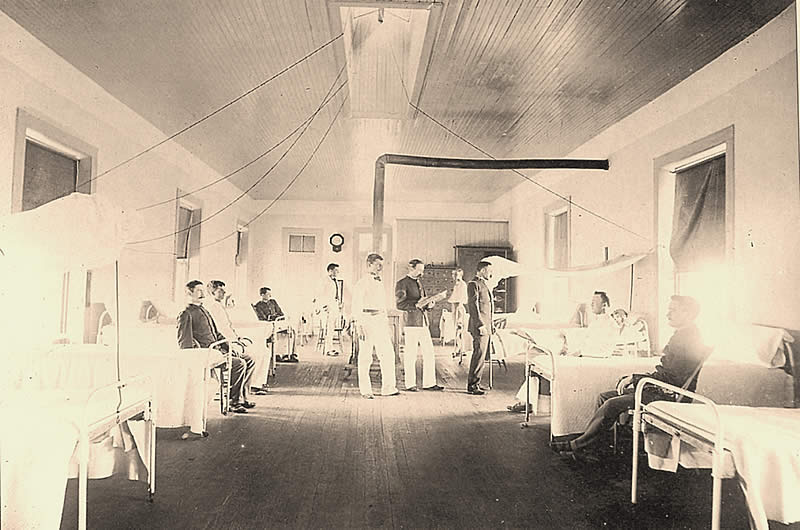As the winter came on, the isolation of the place had a rather depressing effect upon us all. The officers were engaged in their various duties: drill, courts-martial, instruction, and other military occupations. They found some diversion at “the store,” where the ranchmen assembled and told frontier stories and played exciting games of poker. Jack's duties as commissary officer kept him much away from me, and I was very lonely.
The mail was brought in twice a week by a soldier on horseback. When he failed to come in at the usual time, much anxiety was manifested, and I learned that only a short time before, one of the mail-carriers had been killed by Indians and the mail destroyed. I did not wonder that on mail-day everybody came out in front of the quarters and asked: ‘‘“Is the mail. carrier in?”’’ And nothing much was done or thought of on that day, until we saw him come jogging in, the mail-bag tied behind his saddle. Our letters were from two to three weeks old. The eastern mail came via Santa FÉ to the terminus of the railroad, and then by stage; for in 1874, the railroads did not

extend very far into the Southwest. At a certain point on the old New Mexico road, our man met the San Carlos carrier, and received the mail for Apache.
‘‘“I do not understand,”’’ I said, ‘‘“how any soldier can be found to take such a dangerous detail.”’’
‘‘“I should think that when they got into those cañons and narrow defiles, they would think of the horrible late of their predecessor,”’’ said I.
‘‘“Perhaps they do,”’’ he answered; ‘‘“but a soldier is always glad to get a detail that gives him a change from the routine of post life.”’’
I was getting to learn about the indomitable pluck of our soldiers. They did not seem to be afraid of anything. At Camp Apache my opinion of the American soldier was formed, and it has never changed. In the long march across the Territory, they had cared for my wants and performed uncomplainingly for me services usually rendered by women. Those were before the days of lineal promotion.
Officers remained with their regiments for many years. A feeling of regimental prestige held officers and men together. I began to share that feeling. I knew the names of the men in the company, and not one but was ready to do a service for the “Lieutenant's wife.” “K” had long been a bachelor company; and now a young woman had joined it. I was a person to be pampered and cared for, and they knew besides that I was not long in the army.
Officers remained with their regiments for many years. A feeling of regimental prestige held officers and men together. I began to share that feeling. I knew the names of the men in the company, and not one but was ready to do a service for the “Lieutenant's wife.” “K” had long been a bachelor company; and now a young woman had joined it. I was a person to be pampered and cared for, and they knew besides that I was not long in the army.

During that winter I received many a wild turkey and other nice things for the table, from the men of the company. I learned to know and to thoroughly respect the enlisted man of the American Army.
And now into the varied kaleidoscope of my army life stepped the Indian Agent. And of all unkempt, unshorn, disagreeable-looking personages who had ever stepped foot into our quarters, this was the worst.below an indian agent

‘‘“Heaven save us from a Government which appoints such men as that to watch over and deal with Indians,”’’ cried I, as he left the house. ‘‘“Is it possible that his position here demands social recognition?”’’ I added.
‘‘“Hush!”’’ said the second lieutenant of K company. ‘‘“It's the Interior Department that appoints the Indian Agents, and besides,”’’ he added, ‘‘“it's not good taste on your part, Martha, to abuse the Government which gives us our bread and butter.”’’
‘‘“Well, you can say what you like, and preach policy all you wish, no Government on earth can compel me to associate with such men as those!”’’ With that assertion, I left the room, to prevent farther argument.
And I will here add that in my experience on the frontier, which extended over a long period, it was never my good fortune to meet with an Indian Agent who impressed me as being the right sort of a man to deal with those children of nature, for Indians are like children, and their intuitions are keen. They
know and appreciate honesty and fair dealing, and they know a gentleman when they meet one.above apache chief
The winter came on apace, but the weather was mild and pleasant. One day some officers came in and said we must go over to the “Ravine” that evening, where the Indians were going to have a rare sort of a dance.

There was no one to say to me: ‘‘“Do not go,”’’ and, as we welcomed any little excitement which would relieve the monotony of our lives, we cast aside all doubts of the advisability of my going. So, after dinner, we joined the others, and sallied forth into the darkness of an Arizona night. We crossed the large parade-ground, and picked our way over a rough and pathless country, lighted only by the stars above.
Arriving at the edge of the ravine, what a scene was before us! We looked down into a natural amphitheatre, in which blazed great fires; hordes of wild Apaches darted about, while others sat on logs beating their tomtoms.
I was afraid, and held back, but the rest of the party descended into the ravine, and, leaning on a good strong arm, I followed. We all sat down on the great trunk of a fallen tree, and soon the dancers came into the arena.
They were entirely naked, except for the loin-clothq their bodies were painted, and from their elbows and knees stood out bunches of feathers, giving them the appearance of huge flying creatures; jingling things

were attached to their necks and arms. Upon their heads were large frames, made to resemble the branching horns of an elk, and as they danced, and bowed their heads, the horns lent them the appearance of some unknown animal, and added greatly to their height. Their feathers waved, their jingles shook, and their painted bodies twisted and turned in the light of the great fire, which roared and leaped on high. At one moment they were birds, at another animals, at the next they were demons.
The noise of the tomtoms and the harsh shouts of the Indians grew wilder and wilder. It was weird and terrifying. Then came a pause; the arena was cleared, and with much solemnity two wicked-looking creatures came out and performed a sort of shadow dance, brandishing knives as they glided through the intricate figures.
It was a fascinating but unearthly scene, and the setting completed the illusion. Fright deprived me of the power of thought, but in a sort of subconscious way I felt that Orpheus must have witnessed just such mad revels when he went down into Pluto's regions. Suddenly the shouts became warwhoops, the demons brandished their knives madly, and nodded their branching horns; the tomtoms were beaten with a dreadful din, and terror seized my heart. What if they be treacherous, and had lured our small party down into this ravine for an ambush! The thing could well be, I thought. I saw uneasiness in the

faces of the other women, and by mutual consent we got up and slowly took our departure. I barely had strength to climb up the steep side of the hollow. I was thankful to escape from its horrors.
Scarce three months after that some of the same band of Indians fired into the garrison and fled to the mountains. I remarked to Jack, that I thought we were very imprudent to go to see that dance, and he said he supposed we were. But I had never regarded life in such a light way as he seemed to.
Women usually like to talk over their trials and their wonderful adventures, and that is why I am writing this, I suppose. Men simply will not talk about such things.
The cavalry beauty seemed to look at this frontier life philosophically—what she really thought about it, I never knew. Mrs. Bailey was so much occupied by the care of her young child and various out-door amusements, that she did not, apparently, think much about things that happened around us. At all events, she never seemed inclined to talk about them. There was no one else to talk to; the soil was strange, and the atmosphere a foreign one to me; life did not seem to be taken seriously out there, as it was back in New England, where they always loved to sit down and talk things over. I was downright lonesome for my mother and sisters.
I could not go out very much at that time, so I occupied myself a good deal with needle-work.(brackdetville fort building)

One evening we heard firing across the cañon. Jack caught up his sword, buckling on his belt as he went out. ‘‘“Injuns fighting on the other side of the river,”’’ some soldier reported. Finding that it did not concern us, Jack said, ‘‘“Come out into the back yard, Martha, and look over the stockade, and I think you can see across the river.”’’ So I hurried out to the stockade, but Jack, seeing that I was not tall enough, picked up an empty box that stood under the window of the room belonging to the Doctor, when, thud! fell something out onto the ground, and rolled away. I started involuntarily. It was dark in the yard. I stood stock still. ‘‘“What was that?”’’ I whispered.
‘‘“Nothing but an old Edam cheese,”’’ said this true-hearted soldier of mine. I knew it was not a cheese, but said no more. I stood up on the box, watched the firing like a man, and went quietly back into the quarters. After retiring, I said, ‘‘“You might just as well tell me now, you will have to sooner of later, what was in the box—it had a dreadful sound, as it rolled away on the ground.”’’
‘‘“Well,”’’ said he, ‘‘“if you must know, it was an Injun's head that the Doctor had saved, to take to Washington with him. It had a sort of a malformed skull of jaw-bone, of something. But he left it behind —I guess it got a leetle too old for him to carry,”’’ he laughed. ‘‘“Somebody told me there was a head in the yard, but I forgot all about it. Lucky thing you didn't see it, wasn't it? I suppose you'd been scared. below Fort Infirmary

—well, I must tell the fatigue party to-morrow to take it away. Now don't let me forget it,”’’ and this soldier of many battles fell into the peaceful slumber which comes to those who know not fear.
The next day I overheard him telling Major Worth what had happened, and adding that he would roast that Doctor if he ever came back. I was seeing the rugged side of life, indeed, and getting accustomed to shocks.
Now the cavalry beauty gave a dinner. It was lovely; but in the midst of it, we perceived a sort of confusion of moccasined footsteps outside the dining-room. My nerves were, by this time, always on the alert. I glanced through the large door opening out into the hall, and saw a group of Indian scouts; they laid a coffee-sack down by the corner fire-place, near the front door. The commanding officer left the table hastily; the portière was drawn.
I had heard tales of atrocious cruelties committed by a band of Indians who had escaped from the reservation and were ravaging the country around. I had heard how they maimed poor sheep and cut off the legs of cattle at the first joint, leaving them to die; how they tortured women, and burned their husbands and children before their eyes; I had heard also that the Indian scouts were out after them, with orders to bring them in, dead of alive.
The next day I learned that the ringleader's head was in the bag that I had seen, and that the others. The Plsains indians below by TSDSD could easily be modified
had surrendered and returned. The scouts were Apaches in the pay of the Government, and I always heard that, as long as they were serving as scouts, they showed themselves loyal, and would hunt down their nearest relative.
No comments:
Post a Comment